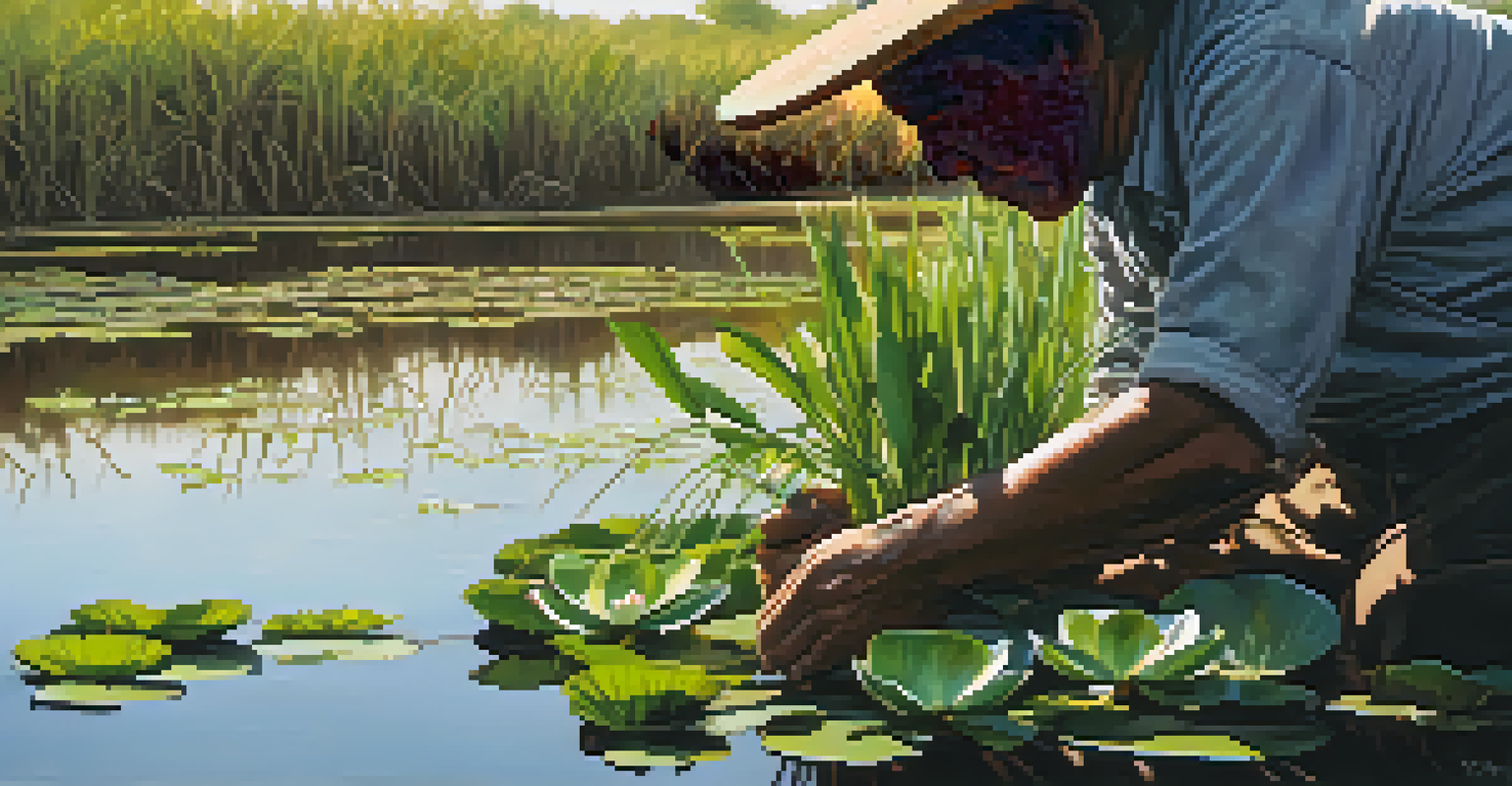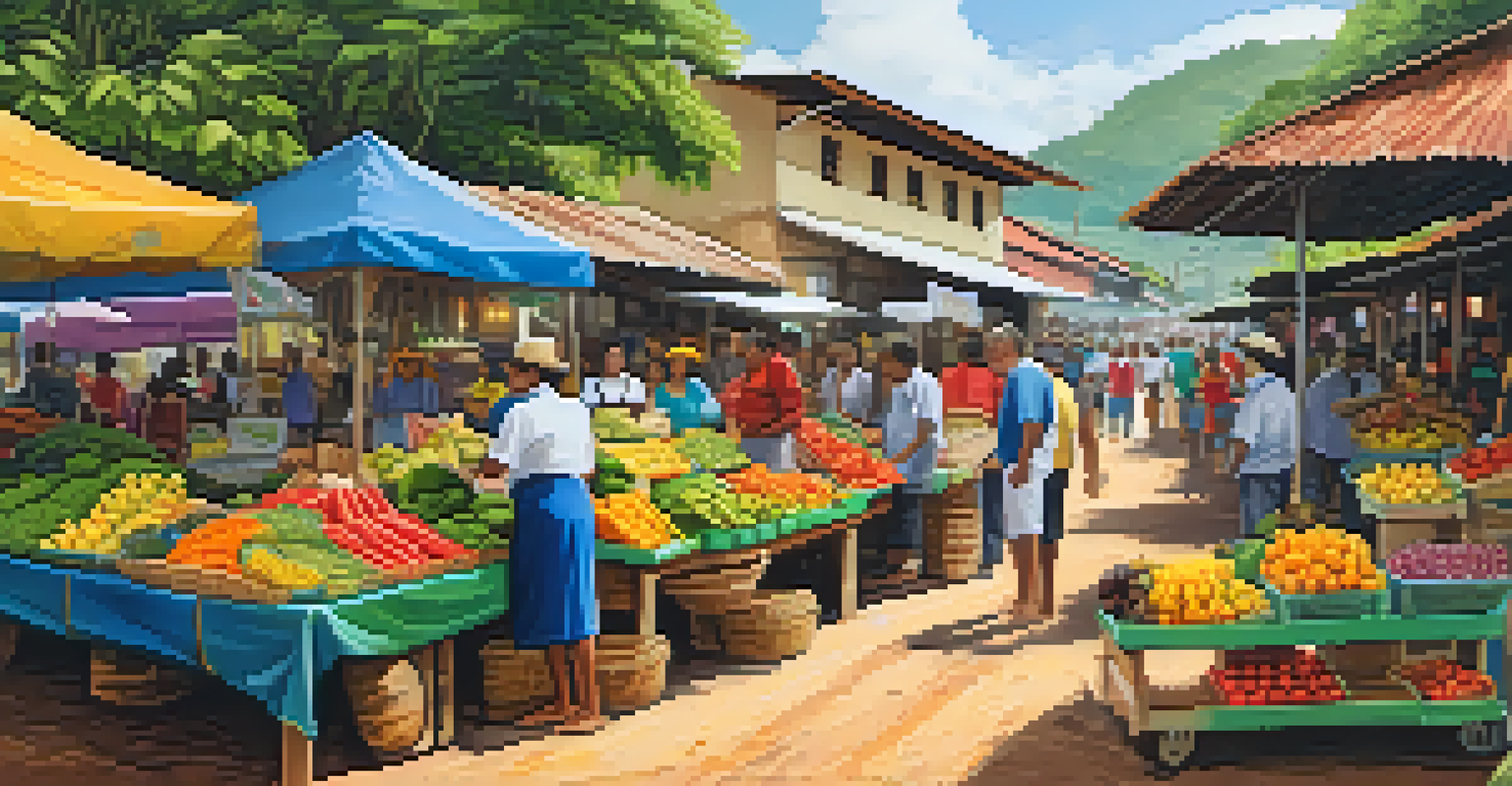Wildlife and Agriculture: Brazil's Ecotourism Blend

The Rich Tapestry of Brazil's Biodiversity
Brazil is home to some of the most diverse ecosystems on the planet, including the Amazon rainforest, the Pantanal wetlands, and the Atlantic Forest. This rich biodiversity not only supports countless species of wildlife but also plays a crucial role in the country's agricultural practices. By understanding and preserving these ecosystems, farmers can enhance their crop yields and maintain ecological balance.
The environment is where we all meet; where we all have a mutual interest; it is the one thing all of us share.
For example, the Amazon rainforest acts as a significant carbon sink, helping to regulate the climate and benefiting agricultural areas by maintaining rainfall patterns. Farmers who practice sustainable land use can leverage this natural resource to improve their agricultural output while conserving the environment. This interconnectedness highlights the importance of biodiversity in shaping agricultural success.
Moreover, Brazil's wildlife, including pollinators like bees and birds, directly impacts crop production. The intricate relationship between agriculture and wildlife illustrates the need for a holistic approach to farming that respects and integrates natural ecosystems. By fostering this relationship, Brazil can secure food production while protecting its unique wildlife.
Ecotourism: A Sustainable Path Forward
Ecotourism in Brazil is more than just a way to attract tourists; it represents a sustainable approach to preserving wildlife and supporting local communities. By promoting ecotourism, Brazil can showcase its stunning natural landscapes while educating visitors on the importance of conservation. This not only generates income for local economies but also encourages the protection of vital ecosystems.

Tourists are drawn to Brazil's unique wildlife experiences, such as observing jaguars in the Pantanal or exploring the diverse flora of the Atlantic Forest. These activities create a demand for responsible tourism practices that prioritize the well-being of both the environment and the communities involved. As a result, ecotourism can serve as a catalyst for sustainable agricultural practices.
Biodiversity Boosts Agriculture
Brazil's rich ecosystems enhance agricultural productivity by providing essential resources and supporting pollinators.
Additionally, ecotourism allows farmers to diversify their income streams by providing accommodations or guiding services. This symbiotic relationship between agriculture and tourism fosters community engagement and incentivizes land conservation, ensuring that both wildlife and agricultural practices thrive in harmony.
Challenges Facing Agriculture and Wildlife Conservation
Despite Brazil's rich biodiversity, challenges such as deforestation, climate change, and unsustainable farming practices threaten both wildlife and agriculture. Deforestation for agricultural expansion not only reduces habitat for countless species but also disrupts the delicate balance of ecosystems. This can lead to soil degradation and diminished agricultural productivity in the long run.
In every walk with nature one receives far more than he seeks.
Climate change further exacerbates these challenges by altering rainfall patterns and increasing the frequency of extreme weather events. Farmers may struggle to adapt to these changes, resulting in reduced crop yields and increased competition for resources. This cycle of environmental stress can have dire consequences for both wildlife and agricultural communities.
To combat these challenges, it's crucial for Brazil to implement policies that promote sustainable agricultural practices while protecting wildlife habitats. By fostering collaboration between farmers, conservationists, and policymakers, Brazil can develop strategies that balance agricultural needs with environmental preservation.
Agroecology: Bridging the Gap
Agroecology offers a promising solution to the challenges faced by Brazil's agricultural and ecological systems. This approach emphasizes the use of sustainable farming techniques that work in harmony with nature, rather than against it. By promoting biodiversity on farms, agroecology can enhance soil health, reduce pests naturally, and improve overall crop resilience.
For instance, integrating native plants into agricultural systems can provide habitat for beneficial insects and pollinators, thereby boosting crop yields. Farmers practicing agroecology can also adopt crop rotation and cover cropping methods, which further enrich the soil and decrease reliance on chemical fertilizers. This not only benefits the environment but also leads to healthier food production.
Ecotourism Supports Conservation
Promoting ecotourism in Brazil not only generates income for local communities but also encourages the protection of vital ecosystems.
Moreover, agroecology encourages local knowledge and community involvement, creating a sense of ownership among farmers. By valuing traditional practices and incorporating local wisdom, Brazil can empower communities to engage in sustainable agriculture while protecting their rich biodiversity.
The Role of Technology in Sustainable Agriculture
Technology is revolutionizing agriculture in Brazil, offering innovative solutions to enhance sustainability and efficiency. Precision farming techniques, such as satellite imagery and data analytics, allow farmers to monitor crop health and optimize resource use. This leads to reduced waste and increased yields, benefiting both farmers and the environment.
Furthermore, advancements in biotechnology are enabling the development of crops that are more resilient to pests, diseases, and climate variability. By adopting these technologies, farmers can reduce their reliance on chemical inputs, promoting a healthier ecosystem. This approach aligns with the goals of conservation and sustainable agriculture.
Additionally, technology can facilitate better communication between farmers and conservationists, fostering collaboration on projects that benefit both wildlife and agriculture. By leveraging technology to bridge these gaps, Brazil can create a more sustainable agricultural landscape that supports biodiversity.
Community Engagement and Education
Engaging local communities in conservation efforts is essential for the success of wildlife and agriculture initiatives in Brazil. Education plays a pivotal role in raising awareness about the importance of biodiversity and sustainable farming practices. By equipping communities with knowledge and resources, Brazil can foster a culture of stewardship towards the environment.
Workshops, training programs, and community-led projects can empower individuals to adopt sustainable agricultural practices that benefit both their livelihoods and local ecosystems. Involving community members in decision-making processes ensures that their voices are heard and their needs are met, leading to more effective conservation outcomes.
Agroecology for Sustainable Farming
Emphasizing sustainable farming techniques, agroecology enhances soil health and boosts crop resilience while preserving biodiversity.
Moreover, educational initiatives can inspire the next generation to appreciate and protect Brazil's unique wildlife and agricultural heritage. By instilling a sense of responsibility and connection to the land, Brazil can cultivate a future where both agriculture and conservation thrive side by side.
The Future of Brazil's Wildlife and Agriculture
The future of Brazil's wildlife and agriculture depends on a collective effort to prioritize sustainability and conservation. As the world faces increasing environmental challenges, Brazil has the opportunity to lead by example, showcasing how agricultural practices can coexist with thriving ecosystems. By embracing innovative approaches and fostering collaboration, Brazil can create a model for sustainable development.
Investment in research and development, along with supportive policies, will be crucial in driving this transformation. By prioritizing agroecology, ecotourism, and community engagement, Brazil can enhance its agricultural productivity while safeguarding its rich biodiversity. This holistic approach will not only benefit the environment but also improve the livelihoods of countless individuals.

Ultimately, the journey towards a sustainable future is a shared responsibility that requires the involvement of farmers, conservationists, policymakers, and local communities. Together, they can forge a path that embraces both wildlife and agriculture, ensuring that Brazil's natural treasures are preserved for generations to come.